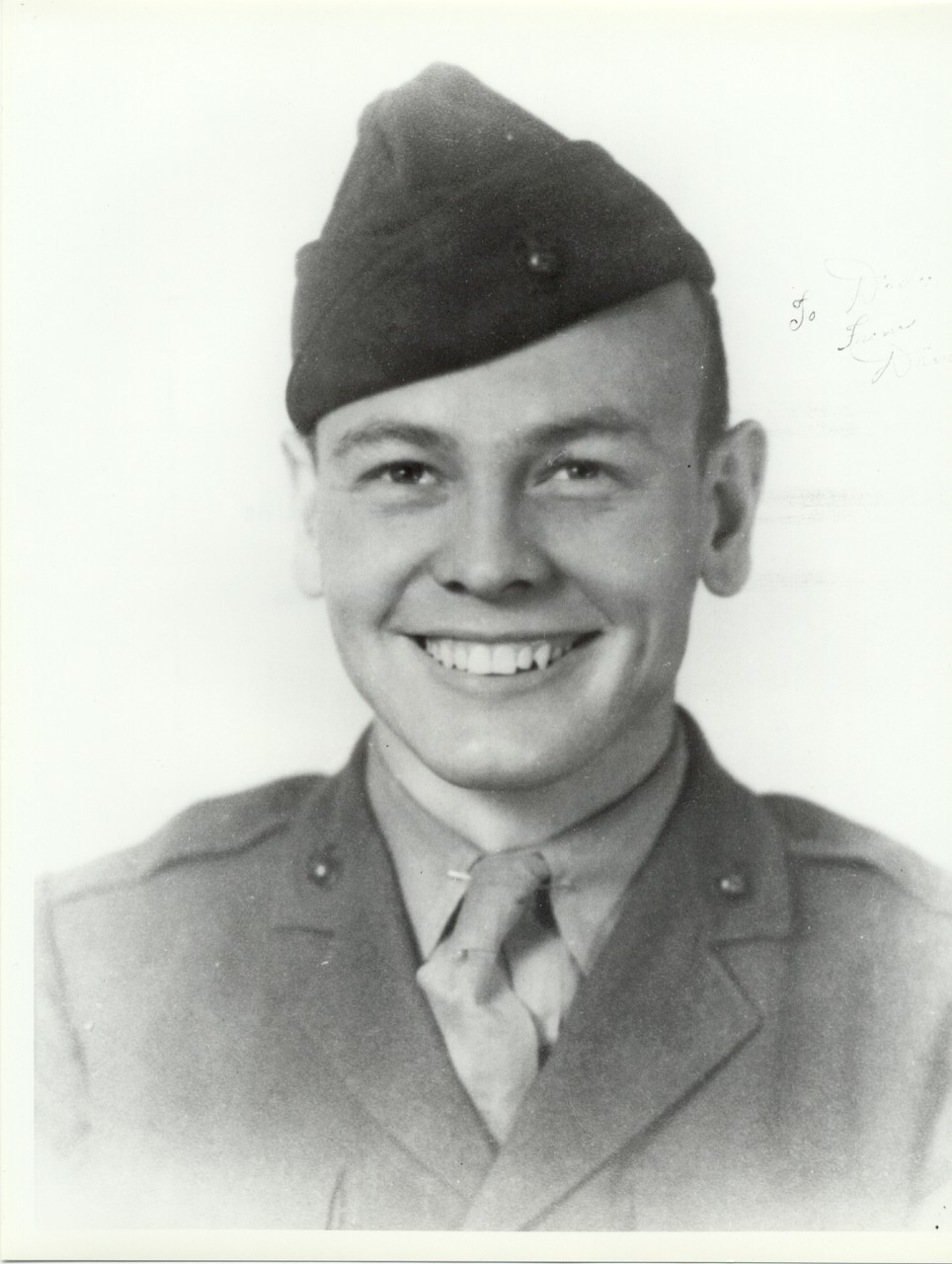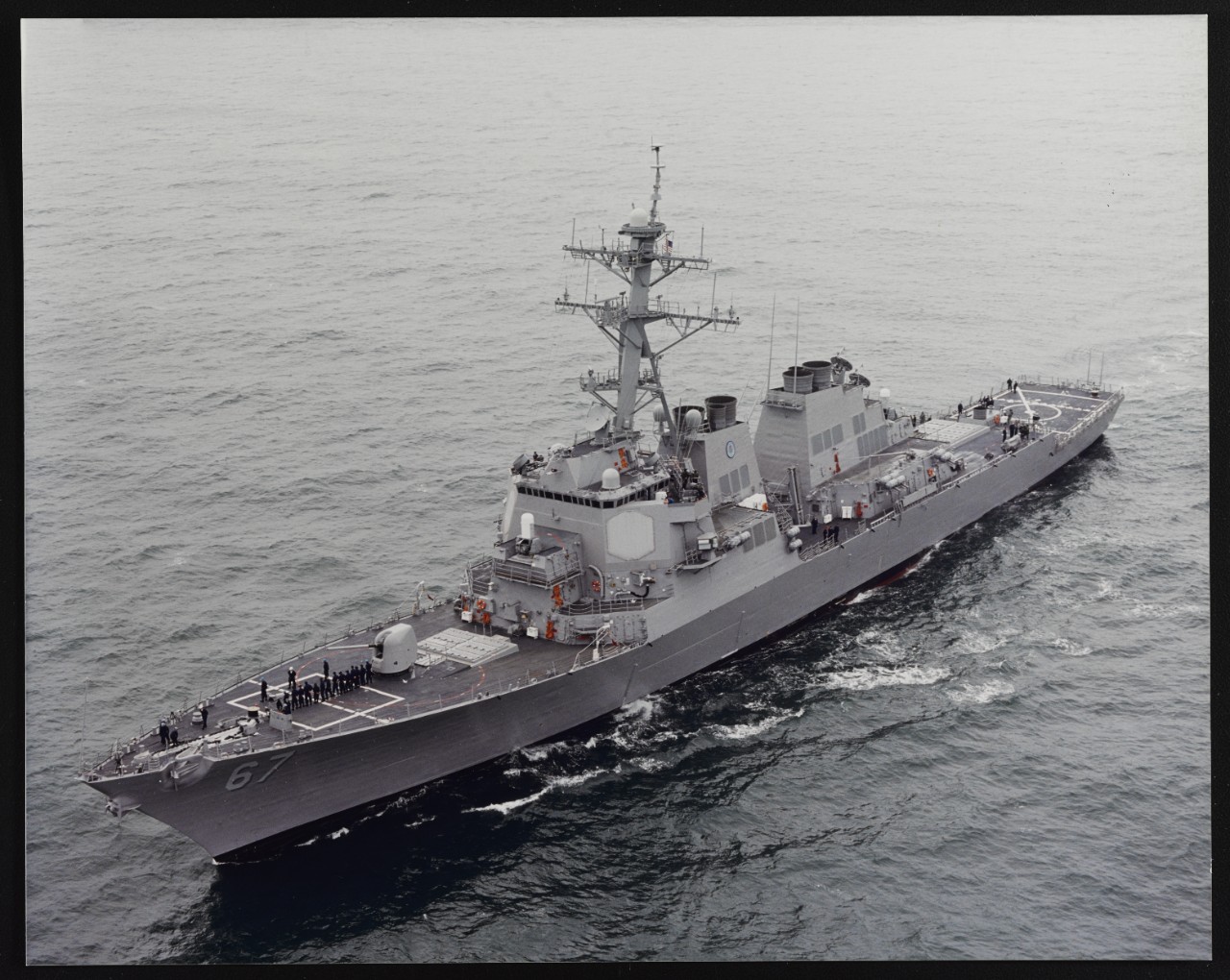Sergeant Darrell Samuel Cole, USMCR
The guided-missile destroyer USS Cole (DDG-67) proudly bears the name of U.S. Marine Corps Sergeant Darrell Samuel Cole who received the Medal of Honor posthumously for his actions during the Battle of Iwo Jima on 19 February 1945.
Cole was born on 20 July 1920, in Flat River, MO. Until he graduated from high school in Esther, MO, in 1938, his main interests in life were playing basketball, hunting, and photography. During his youth, he learned to play the French horn, an accomplishment that would help to shape his destiny later.

Sergeant Darrell Samuel Cole. (Right click to download photo.)
Soon after graduating from high school, Cole joined the Civilian Conservation Corps (CCC), where he became an assistant forestry clerk and assistant educational advisor for his company. Leaving the CCC after one year, he went to Detroit, MI, where he found employment as a skiver machine operator for a firm that specialized in the manufacture of engine gaskets.
On 25 August, 1941, Cole enlisted in the Marine Corps Reserve for the duration of the national emergency. He was sent to Parris Island, SC, for training, where his proficiency with the French horn marked him as a logical candidate for Field Music School—a “field music” being the Marine Corps equivalent of a bugler.
After completing Field Music School, he was transferred to the 1st Marines, 1st Marine Division. On 7 August 1942, he found himself wading ashore with his buddies of Company H, 2d Battalion, on the beaches of Guadalcanal, the first American offensive of World War II.
Field Music First Class Cole had not been very happy about being assigned as a field music. His friends had often heard him complain that he had joined a fighting outfit to fight, not blow a horn. Consequently, when a regular machine gunner of his unit fell wounded, he assumed the role of gunner and acquitted himself in such a manner as to win the praise of his commanding officer.
Immediately after the Guadalcanal campaign, Cole submitted a request to have his rating changed from field music and to allow him to perform the regular duties of a private first class in the weapons company to which he was assigned. His request was disapproved, “due to a shortage of field musics.” He returned to the United States on 2 February 1943, still saddled with his bugle.
In March 1943, he joined the 1st Battalion, 23rd Marines, which were then forming at Camp Lejeune, NC, as part of the 4th Marine Division. Waiting until the unit moved to California, he submitted another request to be relieved of his duties as a field music and permission to perform “line” duties. Again, his request was disapproved, and for the same reason, as the Marine Corps was still short of field musics. In January 1945, Cole was on his way overseas for the second time with the 4th Marine Division.
During the division’s first engagement, at Roi-Namur in the Kwajalein Atoll, Cole, forsaking his bugle, went into action as a machine gunner.
Four months later, the 4th Marine Division stormed ashore at Saipan, where Cole had managed to be assigned to his beloved machine guns. Because of his proven ability in combat, he was designated as a machine gun section leader. During the battle, his squad leader was killed and Cole, although wounded himself, assumed command of the entire squad and acquitted himself in such a manner to be awarded the Bronze Star Medal for “…his resolute leadership, indomitable fighting spirit and tenacious determination in the face of terrific opposition….”
A few days after the battle of Saipan, he led his squad ashore in the invasion of the neighboring island of Tinian and continued to live up to his fast growing reputation as “The Fighting Field Music” throughout the campaign.
After the Marianas campaigns, Cole requested a change of warrant for the third time. Pointing out his experience and combat record, he stated that he felt he would be of more benefit to the Marine Corps performing line duties rather than those of field music. This time his request was approved, and he was redesignated as a corporal.
In January 1945, Sgt. Cole, who had been promoted the previous November, sailed with his company for an unknown island that was to become one of the most famous battlefields of American history—Iwo Jima.
On D-Day, 19 February, Sgt. Cole led his machine gun section ashore in the assault on Iwo Jima’s shifting beaches. One of his squads had hardly reached dry land before their advance was halted by a deadly hail of fire from two enemy positions. Taking stock of the situation, Cole crawled forward and wiped out the two positions with hand grenades. His unit continued the advance until they were again halted by fire from three Japanese pillboxes. One of Cole’s machine guns silenced the most threatening position and then jammed.
Armed only with a pistol and one hand grenade, Cole made a one-man attack against the two remaining positions. Twice he returned to his own lines for additional grenades and continued the attack under the fierce enemy fire until he had succeeded in destroying the Japanese strong point. Returning to his own squad, he was killed instantly by an enemy grenade. By his one-man attack and heroic self-sacrifice, Cole enabled his company to move forward against the remaining fortifications and attain their ultimate objective.
The nation’s highest military award, the Medal of Honor, was posthumously awarded to Cole for his unselfish act of heroism. The field music who had desperately wanted to be a great fighting man had at last achieved his ambition. The Medal of Honor was presented to his wife on 17 April 1947.
Sergeant Cole was buried in the 4th Marine Division Cemetery on Iwo Jima. At the request of his father, his remains were returned to the United States and were reinterred in the Park View Cemetery near Farmington, MO.
In addition to the Medal of Honor and Bronze Star Medal, Sgt. Cole was awarded the Purple Heart with Gold Star in lieu of a second award, the Presidential Unit Citation, American Defense Service Medal, Asiatic-Pacific Campaign Medal, and the World War II Victory Medal.
Source
Compiled by the Naval History and Heritage Command from source material of the Marine Corps History Division.



